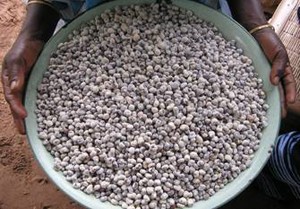
In southeastern Senegal, baobab seeds were once believed to be a useless byproduct of a locally grown fruit. The fruit was eaten and the seeds merely tossed aside.
But now, in the village of Dindéfélo, women are reaping gains from baobab fruit processing for the first time thanks to a USAID program. A facilitator for the Agency first put women in contact with a cosmetics firm who uses the seeds in their products. USAID is now expanding its efforts to assist other Senagalese villages to find markets for this growing commodity, empowering local women in the process.
"The USAID program facilitator came and informed us that they had a partner who was ready to buy the seeds, so we should not throw them away," says Mrs. Aicha Bousso, Secretary General of Bourakha Federation from the nearby village of Salemata. "We thank USAID very much. It is our first partner."
This partnership began in 2009 with Bio Essence, a cosmetics manufacturing firm. The baobab seed powder is a key ingredient in cosmetics, such as fragrant body oils. Once the producers and buyers for this commodity were connected, the Senegalese farmers were able to begin selling a previously unmarketable by-product. Since then, the selling price for their baobab seed powder has almost doubled, further improving the local economy and providing new income-generating opportunities for many rural women.
"The processing of the baobab fruit into powder provides us with a lot of income. It is really interesting because we could not have earned so much with other activities," says Mrs. Fatoumata Diallo, a member of Dhoudha Bourakha Association. "What's more," she adds, "this activity is not exhausting like other work in the fields."
USAID is now assisting to expand this new processing activity throughout the Kédougou region of Senegal, thereby raising incomes and creating new opportunities for small-scale farmers to diversify their activities and connect to new markets.
"I am seriously calling on women to take on this activity," Mrs. Diallo said. As she acknowledged, in an industry where women are the target consumers, it is gratifying to know that their money helps support other women who are the suppliers.







Comment
Make a general inquiry or suggest an improvement.